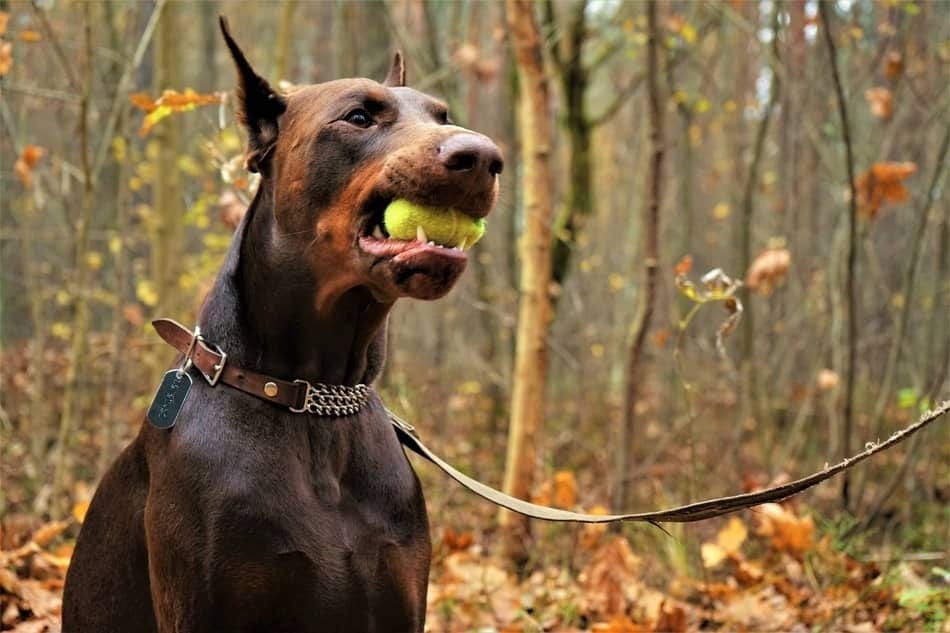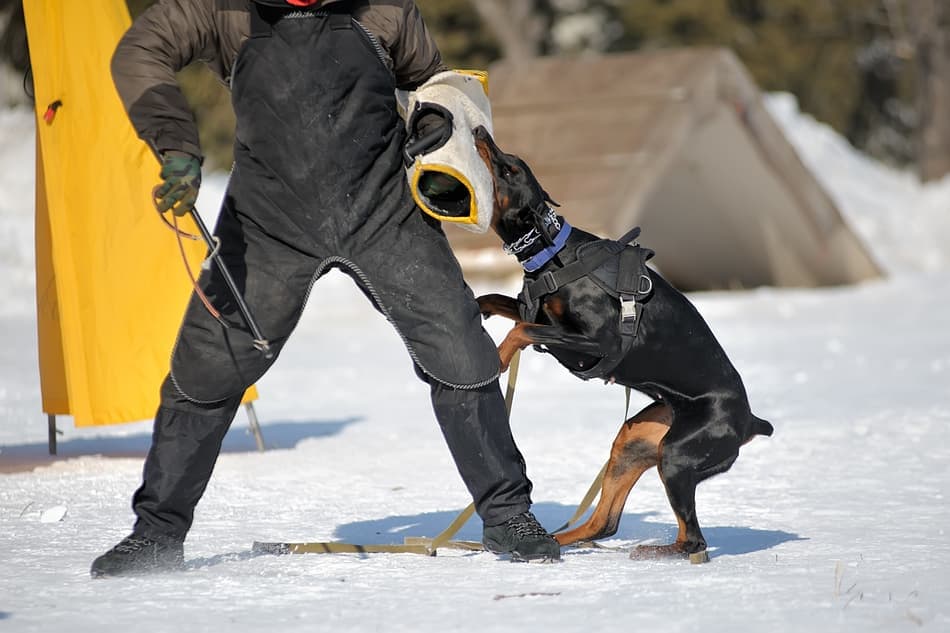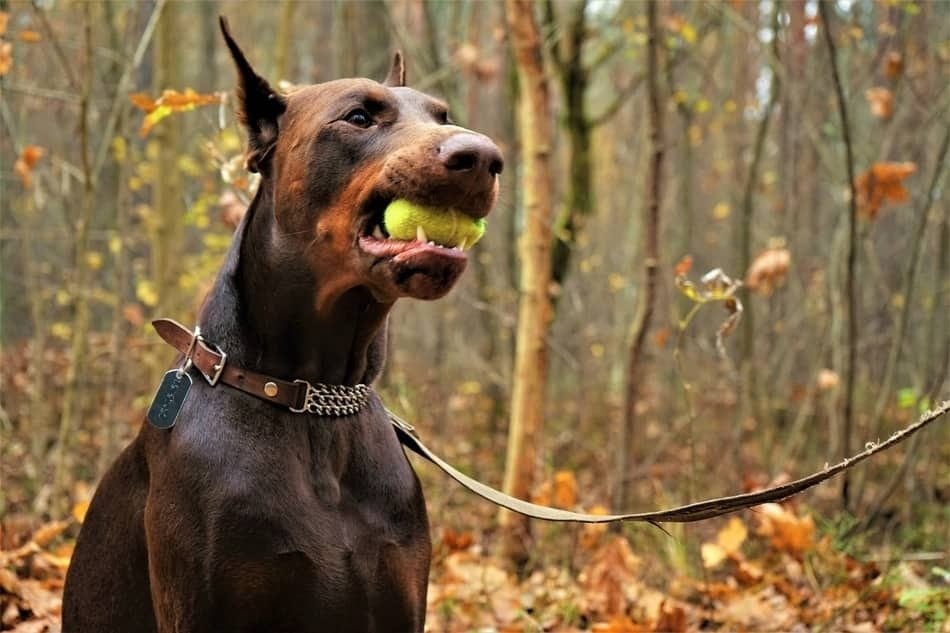Do Dobermans have lockjaw? This common question stems from a long-standing misconception about this breed. Many people believe that Dobermans have the ability to lock their jaws in a vice-like grip, making them formidable and dangerous. However, this notion is purely a myth and lacks scientific evidence.
The idea of lockjaw in Dobermans likely originated from their strong and powerful jaws, which are known for their ability to deliver a firm bite. Dobermans were historically bred for their protective and guarding instincts, which necessitated strong biting power. While their jaws may be strong, it does not mean they possess any unique ability to lock their jaws in place. This misconception has perpetuated over time, but it is important to understand that Dobermans do not have lockjaw.
While the term “lock jaw” is often associated with Dobermans, they do not actually have lock jaw. In fact, no breed has lock jaw. Lock jaw is a misconception that stems from the powerful bite force of certain breeds, including Dobermans. They have strong jaws due to their genetic makeup, but it does not cause their jaws to lock. It’s important to understand that this is a myth and that Dobermans, like any other breed, do not have lock jaw.

Do Dobermans Have Lock Jaw?
Lockjaw is a term commonly associated with certain dog breeds, particularly Doberman Pinschers. It refers to the notion that these dogs have the ability to lock their jaws in place, making it difficult to release their bite. But is this really true? Let’s dive into the topic and explore whether Dobermans have lockjaw or if it’s just a myth.
Understanding Lockjaw in Dogs
Lockjaw, also known as tetanus, is a serious medical condition that affects the muscles and nerves, causing muscle stiffness and spasms. However, when people refer to lockjaw in relation to certain dog breeds, they are usually talking about their bite strength and ability to maintain a firm grip. With this in mind, let’s explore whether Doberman Pinschers possess this characteristic.
The Bite Strength of Dobermans
Doberman Pinschers are a strong and powerful breed with a notable bite force. However, it is important to note that all dog breeds have the ability to exert considerable pressure with their jaws. The force generated by a dog’s bite can vary depending on various factors, including individual strength, size, and temperament. While Dobermans have a strong bite, it does not mean they possess a special ability to lock their jaws.
The Myth of Lockjaw in Dobermans
The idea that Doberman Pinschers or any other dog breed can lock their jaws is nothing more than a myth. All dogs have the same anatomical structure when it comes to their jaws. They have a joint called the temporomandibular joint, which allows them to open and close their mouths. There is no mechanism in their jaws that enables them to lock into place.
Debunking Misconceptions
There are several misconceptions surrounding lockjaw in Dobermans that need to be addressed:
- Dobermans do not possess a unique “locking” mechanism in their jaws.
- Their bite force is strong, like many other large dog breeds.
- The term lockjaw often refers to tetanus, a medical condition unrelated to the biting ability of dogs.
- It is important to remember that a dog’s bite strength is influenced by genetics, training, and individual temperament.
- Proper socialization and training are essential for all dog breeds, including Dobermans, to ensure they behave appropriately.
Caring for Dobermans
While Dobermans do not have lockjaw, they are still a powerful and energetic breed that requires proper care and training. Here are a few tips for taking care of your Doberman:
- Provide regular exercise to keep them physically and mentally stimulated.
- Ensure they receive proper training and socialization from a young age.
- Maintain regular veterinary check-ups to monitor their health.
- Feed them a balanced and nutritious diet suitable for their age and activity level.
- Keep them mentally engaged with puzzle toys and interactive games.
- Provide a safe and secure environment for them to live and play.
The Truth About Doberman Jaws
Doberman Pinschers are a magnificent breed known for their loyalty, intelligence, and athleticism. However, the notion of lockjaw in Dobermans is unfounded. Like any other dog breed, their biting ability is determined by their genetics and training, not by a mystical ability to lock their jaws. Understanding the facts behind this myth is essential to dispel any misconceptions about Dobermans and promote responsible ownership.
Are Dobermans Safe Family Pets?
Dobermans can make excellent family pets when raised and trained properly. While they are a strong and protective breed, they can be gentle and loving with their human family members. It is important to note that individual temperament can vary, so early socialization and positive training are crucial to ensure a well-adjusted and safe family pet.
Key Takeaways
- Dobermans do not have a lock jaw.
- Lock jaw is not a breed-specific trait.
- There is no scientific evidence to support the idea of lock jaw in Dobermans or any other dog breed.
- Lock jaw is a myth that has been perpetuated by misinformation and false beliefs.
- Proper training and socialization are important for all dog breeds, including Dobermans.
Frequently Asked Questions
In this section, we will answer some common questions about whether Dobermans have lockjaw.
1. Are Dobermans known for having lockjaw?
Dobermans do NOT have lockjaw. This term is a myth that has been associated with certain breeds, including Dobermans, but it is not true. Lockjaw refers to a condition where a dog’s jaw becomes locked or seized due to muscle cramping or tetanus infection. Dobermans do not have any unique anatomical features or genetic predisposition that would cause them to develop lockjaw.
In fact, Dobermans have a normal range of motion in their jaws, just like any other dog breed. They have strong jaws and powerful muscles, but this does not mean they have a locking mechanism in their jaw. The ability to open and close their mouths is vital for eating, drinking, panting, and communication.
2. Can Dobermans have a strong bite?
Yes, Dobermans have a strong bite. They are known for their powerful jaws and bite force, which is one of the reasons why they are often used as working dogs in tasks such as protection, police work, and search and rescue. Their bite force can vary from individual to individual, but overall, they have a strong and capable bite.
However, it is important to note that having a strong bite does not mean they have a locking mechanism in their jaw. Their bite strength is a result of their musculature and jaw structure, not due to a locking ability. They can grip and hold onto objects firmly, but their jaws do not become locked in place.
3. Do Dobermans have any unique jaw characteristics?
While Dobermans do not have a lockjaw, they do have some unique jaw characteristics that distinguish them from other breeds. One notable feature is their scissor bite. Dobermans have a dental arrangement where the upper incisors closely overlap the lower incisors, resulting in a clean and powerful bite.
Additionally, their jaws are strong and well-muscled, allowing them to exert force when biting. This, combined with their athleticism and agility, makes them effective in various tasks that require biting and gripping, such as apprehending suspects or participating in dog sports.
4. Are there any breeds with a locking jaw?
No, there are no dog breeds with a locking jaw. The notion of certain breeds having a locking jaw is a myth and has no basis in reality. All dog breeds, including those with strong jaws and powerful bites, have a normal range of motion in their jaws.
It is important to understand that any dog’s ability to hold onto an object or exert force with its jaws is due to the strength of its muscles and the structure of its jaw, not because of a locking mechanism. The idea of a locking jaw has been perpetuated through misinformation and media portrayals, but it is not accurate.
5. How can I ensure the well-being of my Doberman’s jaw?
To ensure the well-being of your Doberman’s jaw, it is essential to provide them with proper dental care. Regular brushing and dental check-ups can help maintain their oral health and prevent any potential issues related to their jaw or teeth.
It is also important to provide your Doberman with appropriate toys and chew items that are safe and designed for dogs. These toys can help satisfy their natural chewing instincts and promote jaw strength. However, always supervise your dog during playtime to prevent any accidents or injuries.

In summary, the idea of Dobermans having “lockjaw” is a myth. There is no scientific evidence to support the belief that Dobermans or any other dog breed has the ability to lock their jaws.
While Dobermans have strong jaws and can exert a significant amount of force when biting, their jaws function like those of any other dog, without any special mechanism causing them to lock.
